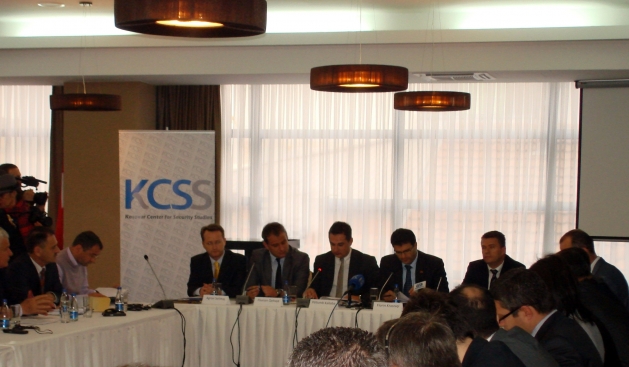28/03/2012

Under the auspices of the Kosovar Center for Security Studies (KCSS) and the Geneva Centre for the Democratic Control of Armed Forces (DCAF) and in cooperation with the Parliamentary Committee for Supervision of the Kosovo Intelligence Agency (KIA), in Prishtina was held a roundtable "Fostering intelligence oversight in Kosovo: between transparency and secrecy".
KCSS Executive Director, Florian Qehaja, presented the findings of the analytical report "Governance of KIA" as part of DCAF Project for Strengthening Intelligence Oversight in the Western Balkans. Despite ongoing consolidation of KIA, research has mainly emphasized the lack of transparency and the importance and role of the triangle cooperation between Parliament, KIA and Civil Society.
The purpose of this discussion is oriented to the evaluation of KIA supervision based on KCSS research, to strengthen cooperation between the Assembly and civil society in overseeing KIA, exchange knowledge and expertise with international experts engaging civil society and Parliament related with the governance of security sector; and to exchange knowledge and experiences with international experts on the commitment of the intelligence supervisory bodies with the public. This table is divided into three panels ranging from "The consolidation of mechanisms and tools for overseeing Intelligence Agency - Lessons from Kosovo" where the chairman of the Committee for KIA, Mr. Florin Krasniqi, stressed that Kosovo has lost much by the lack of professional debates in terms of strengthening intelligence oversight, while focusing more on issues of daily politics. Despite good cooperation between the KIA and the European Commission, according to Mr. Krasniqi, KIA must remain a national institution without 'partition' and internal politicization, as a potential danger that threatens the institution. Chief inspector of KIA, Mr. Agron Selimaj, stressed that KIA is open for cooperation within the mandate and the limitations it has, and has opposed in principle the need to have greater transparency. According to him, the border around transparency and secrecy is a matter of perception, so this debate will exist in the future. Mr. Selimaj has commended the launch of a valid debate by KCSS and has encouraged the establishment of the role of civil society in this regard.
In the roundtable it was discussed about the civil society engagement with the parliament in governance of security sector and public engagement with intelligence oversight bodies. Besides members of the Committee, this roundtable have participated several international experts as Vadain Agnes - former deputy Minister of Hungarian Defense Ministry and former chief of National Security Committee in the National Assembly of Hungary, currently member of the National Assembly of Hungary, Aidan Wills, expert from DCAF, Dyfian Jones, expert on parliamentary oversight of the United Kingdom and Arjan Durmishi by Institute for Democracy and Mediation in Tirana.